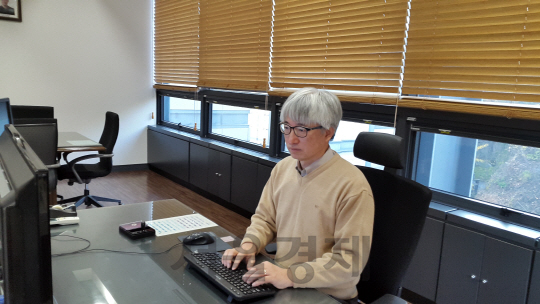Department News
Professor Maeng Hyo Cho Awarded “November’s Person of the month in Science and Technology”
SNU Mechanical and Aerospace engineering Professor Maeng Hyo Cho has successfully predicted changes in materials from light using a multiscale analysis technology, which can be applied in the semiconductor/battery industry which requires complex calculations. He has received offers from the American Company Boeing for usage in aero-part development. “It should help overcome engineering problems in the industry” says, Professor Maeng Hyo Cho.

[Picture] November’s Person in Science and Technology awardee professor Maeng Hyo Cho using a computer to model the multiscale analysis technology for light sensitive polymer materials./ Photo by = Professor Maeng Hyo Cho’s research team
Recently, there has been a focus in light sensitive polymer materials in the science field focused on mechanical engineering and physics. This is because when a object is made from light sensitive materials, movement of the object can be controlled from a long distance away by shining light at it. The problem is how much movement and precision. Machine sizes are progressively getting smaller with semiconductors in the nanoscale being introduced as well.
Professor Maeng Hyo Cho, November’s Person of the month in science and technology (Hosted by MSIP in collaboration with the NRF and Seoul Economic Daily), has successfully managed to develop the world’s first multiscale analysis technology for applications in the mechanical movement design of light sensitive polymers. Multiscale is an approach that analyses a phenomenon through a micro and macro approach for different regions.<?xml:namespace prefix = "o" ns = "urn:schemas-microsoft-com:office:office" />
|
[Picture] Multiscale analysis overview of light sensitive polymer structures reacting to light. By predicting the change in the light reactor within a specified ratio, a polymer model taking into account the small light sensitive structures can be made. Changes obtained in the small structures can be used to analyze actual visible aspects. /Photo by SNU |
Article : http://www.sedaily.com/NewsView/1L3WIW8HTX
Additional Articles :
http://www.sedaily.com/NewsView/1L3WIJ8Y9E
http://www.enewstoday.co.kr/news/articleView.html?idxno=637611


